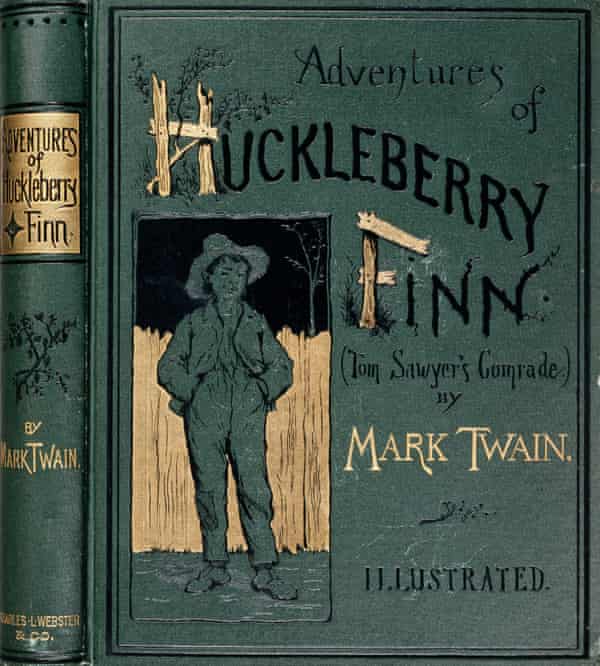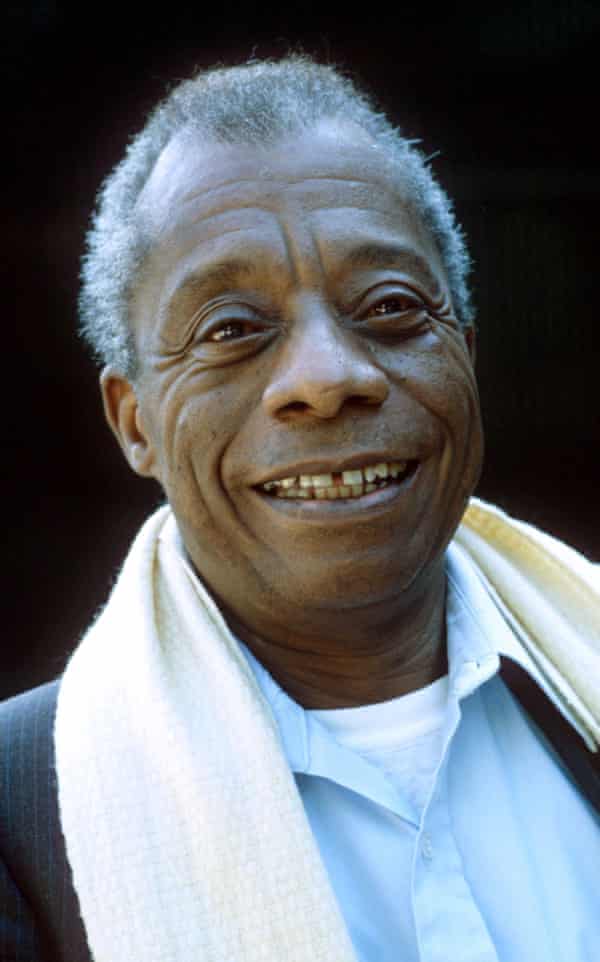Value of Reading Huck Finn Black Critics
O ne of the charges against Rachel Dolezal, the "biologically white" woman who recently resigned from the Spokane chapter of the National Clan for the Advancement of Colored People, is that she misrepresented herself in her awarding to Howard University, an elite and historically black university where she did a principal of fine arts. Considering of her interest in African American fine art, the admissions office causeless that she was black.
A number of people have made the connection between Dolezal and Coleman Silk, the hero of Philip Roth's novel The Homo Stain – a lite-skinned blackness man who spends most of his bookish life passing for Jewish, until a slip of the tongue gets him fired. He refers to 2 chronically absent students as "spooks" – the students are black, which he didn't know, and they lodge a complaint against him for using a term that can be understood as racist abuse. As it happens, Silk too went to Howard – where, going off-campus in Washington DC, he heard the give-and-take "nigger" used against him for the kickoff time – and reacted against the strong racial identification that he felt was forced on him at that place. Just one in a series of events and reactions to events that persuaded him somewhen to laissez passer himself off as white.

Of course, Roth himself is guilty (if that's the correct discussion) of writing intimately about what it feels similar to be blackness. He brings his usual ravenous intellectual appetite to the task, merely one of the curious things near his description of Silk is the similarity to another famous Roth hero, "Swede" Levov, from American Pastoral, another almost-all-American kid, star athlete and scholar, whose "most" stems from the fact that Levov isn't a Wasp – he's Jewish. Silk is a high-schoolhouse track champion and Golden Glove-level boxer. He get-go passes himself off as white at a tournament at West Signal, where his Jewish coach (Silk is the only non-Jewish fighter) tells him to let everyone assume he's simply another one of the boys. Roth takes u.s. through Silk'southward conversion stride by step, in exhaustive and persuasive particular. Nevertheless, you feel running through his account the knowledge that exclusion from the The states mainstream was undercut in his experience and others' by their dearest of American sports.
The questions this raises is whether the Jewish experience and the black experience are translatable into each other – Roth raises it himself – or whether at that place's some essential difference between the two classes of American outsider, some human stain, that keeps showing through. Ane divergence, of form, between being Jewish and black is that you tin can opt to go Jewish; in that location's a process for that. And diverse commentators have referred to Dolezal as transracial, as though the softening of the boundaries betwixt the genders might utilise to race as well. Other experts are brought in to oppose this view. But the truth, for novelists at to the lowest degree, is that all these boundaries are supposed to be permeable. Otherwise, how are you lot going to write?
In 1984, on the 100th anniversary of the publication of Huckleberry Finn, Norman Mailer wrote in the New York Times: "Reading [the novel] one comes to realise all over over again that the nigh-burned-out, throttled, hate-filled dying affair between whites and blacks is still our groovy national love affair, and woe to united states of america if it ends in detestation and common misery. Riding the current of this novel, we are dorsum in that happy time when the love affair was new and all seemed possible."
My own experience of that love affair has necessarily been a very narrow i – we alive just the ane life. The neighbourhood I grew up in had a founding map that specified that no 1 of African descent could alive in that location, except in the capacity of retainer. Of course, past the fourth dimension my family arrived in Austin, Texas, in 1975, that condition had go illegal and unenforceable – merely it didn't need to be enforced. No blackness family unit lived on our street, and I doubt I saw many black kids in the local park. My parents bought our house from an old Texas woman whose African American servant lived in the hut at the bottom of the garden. It was tiny; we later called it the playhouse, and used it as a base for the kind of beautiful Tom Sawyer-like escapades that spoil the catastrophe of Huckleberry Finn.
The junior high I got bussed to was a specialist school in east Austin, one of those neighbourhoods urban planners had managed to separate by highway from the remainder of the city considering black people lived in it. A friend of mine once complained to me that he felt a bit similar "table salt in a pepper pot" in that school. This is not the kind of phrase a 12-year-quondam makes up. He must take heard it somewhere.The fact that this line has stuck with me for 30 years suggests that fifty-fifty then it left a gustatory modality in my oral fissure, but information technology's besides true that I had no black friends, except for i child on the basketball squad, who used to ride the bench with me. He did very good Bill Cosby impersonations. My mother says he visited our firm once (a big clapboard colonial revival from the 1920s) for a playdate, but if he did I've blocked out the memory, and in any case I never got invited back.
And yet it was a dearest-affair, too, though unreciprocated. The ballplayers I liked were all blackness. Michael Jordan was something of an obsession, and shone at the tip of that constellation of glory reference points past which my family navigated the supper-table conversation (along with Philip Larkin and Cheers'due south Sam Malone). Only I read Langston Hughes, likewise, in the aforementioned way I read Heinrich Heine – because I was a nerd with a jones for intellectual folk-simplicity. Every day, the school bus drove through the run-down streets surrounding the school: cars in the grass, peeling paint, sagging roofs, people sitting on the porch. I didn't know anyone who lived in that location.
Last week I reread The Adventures of Huckleberry Finn, which I had loved in high school. Mailer, in his NYT piece, describes it playfully as a wonderfully precocious first novel, total of talent and energy. This isn't quite a backhanded compliment simply he also meant to put the book in its identify. Part of what impressed Mailer is the fact that Huck Finn is the kind of novel that could nevertheless launch a career today – that would nevertheless seem fresh and promising. A semi-orphaned boy heads off downwardly the Mississippi with a runaway slave. The central conceit of the book is that Huck feels guilty near not turning Jim in – basically, because past helping Jim he'south participating in a robbery. Jim "belongs" to the widow Miss Watson, who had ever been kind to Huck. And nevertheless he can't help liking Jim as well, admiring and sympathising with him, so that his refusal to shop Jim becomes merely another part of Huck'due south general depravity, his refusal to get "civilised". The reader, feeling this tension in him betwixt what he should do and what he thinks he should practice, can't help rooting for the kid to follow his instinct.

Five years before Mailer's slice, James Baldwin gave a lecture at Berkeley in which he talked virtually his struggles equally a writer to find literary models. "I did not hold at all with the moral predicament of Huckleberry Finn concerning nigger Jim." (His audience – mostly white? – tin be heard laughing.) "It was not after all a question about whether I should be sold back into slavery." Baldwin, very elegantly, is laughing a piddling likewise. And of course he's right. The appeal the novel makes depends on a very obvious supposition about his audience: the drama, for Twain, is about a white man fighting his censor, not a black man fighting for his freedom.
But what'south curious near Baldwin'southward remark is that a few minutes before he had been discussing his need, equally a author, to find an American vernacular – i of the legacies of Huck Finn. For Baldwin, the rhythms of the language he wanted couldn't be heard or found while he was living in usa; he needed to get to Paris before they came to him, just equally Saul Bellow, some other cultural outsider to Wasp America, didn't observe the voice for Augie March until he saw Parisian cleaners sweeping the streets.
Baldwin is one of the few U.s. writers of his generation as comfortable writing white characters equally black characters (or the other way effectually). Merely if this is the standard (and it seems as proficient as any other) for a novelist who has come to terms with the "trouble of America", Bellow makes an interesting test case. Ane of the running subplots of Bellow's Mr Sammler's Planet, which won the National book accolade in 1971, involves a blackness pickpocket whom Sammler watches from the windows of a bus. Somewhen the thief notices that he'due south been noticed and stalks the ageing Jewish hero back to the lobby of his apartment building. In that location he pushes Sammler into a corner and pulls down his ain pants, exposing his large cock, forcing the old guy to admire it. Bellow comments: "[Sammler] was never to hear the blackness man'due south vocalism. He no more than spoke than a puma would." At that place's more along these lines, none of which looks great at present; even at the fourth dimension, it probably didn't expect bully. To my race-sensitive ears, on reading it 45 years after the novel was published, information technology was well-nigh plenty to make me surrender on the book.
In 2007, Penguin reissued the novel with a new introduction, by the black author and essayist Stanley Crouch. "When it arrived, the deeper meanings of Mr Sammler'due south Planet were missed past those afraid that Bellow had become a racist and a dotard who didn't recognise the importance of all the changes that were streaking – butt naked – across the American scene." Crouch'south essay is a polemic in favour of high civilisation: "In this time of low democratic morale information technology is expert to remember that some writers in this country aren't afraid of the big bad wolves of pop culture and refuse to slink along with the cowards of our academies, those who are all as well willing to add materials to the reading lists of their courses – if that ways their most self-serving colleagues and orneriest students will pick another people to harass."
That phrase, "the cowards of our academies", suggests exactly the sort of people who refused to stand upward for Coleman Silk in The Human Stain. According to Hunker, the bang-up failure of the American novel is that it has non adequately addressed the diversity of the American experience for fear of getting the other wrong. Television, he argues, has done a better job. Of course, at that place are white writers who have taken information technology on. Hunker praises Faulkner for Go Downward, Moses, simply more than recently, Nib Cheng in Southern Cross the Canis familiaris, Jonathan Lethem in The Fortress of Solitude and Michael Chabon in Telegraph Avenue have not only written about black characters (from a white indicate of view) but adopted their voices every bit well. Chabon's book was generally well received, simply came under burn down from black writers who disliked his appropriation of a black vocalization, and suffered from the hesitations of white reviewers who felt unqualified to gauge it.
Hunker connects these hesitations to the ascension influence of memoir or what the writer David Shields refers to equally "reality hunger": "If I don't write nigh y'all, yous won't write virtually me. I'll stick with my favourite subject – myself – and I propose yous do the same." Crouch traces the history of this failure back to the publication of William Styron'due south Confessions of Nat Turner, "which told the fictionalised story of the slave who led a bloody and squelched revolt in Due south Carolina in 1831". Styron's book won the Pulitzer prize, only information technology besides received a "public flogging" from a number of black intellectuals who published a lengthy "response" to it."Styron was no Faulkner," Crouch writes. "His book was not practiced, which may have been one of the reasons that James Baldwin … loved it so and said that information technology expressed his own feelings with such accuracy."
The trouble is writing is hard, and bad writing is congruent to discrimination – it imagines people to be less profound than they really are. If I write badly nigh expat American half-Jews living in London, and then that'due south just bad writing. Simply if I make the aforementioned mistakes virtually whatsoever other group information technology looks similar and may well be a reflection of some deep prejudice. All of which means that taking on substantial characters whose experiences differ widely from your ain can be an act of small courage for a writer.
Simply white writers tin can be criticised for not writing black characters, too. Lena Dunham responded to this complaint in the 2nd series of Girls. Hannah Horvath briefly dates a black Republican, and the couple share an uncomfortable scene that leaves unclear whether the relationship fails because of political or racial differences. It'south a clever slice of self-critical self-consciousness, simply in its way may be no less "symbolic" than Bellow'due south pickpocket. As Ta-Nehisi Coates put it in a largely favourable response, "I have never met a black Republican in all my fourth dimension in New York. And I'1000 blackness. And then I have trouble assertive that Hannah found that one black dude in Brooklyn who is anti-matrimony equality, anti-ballgame, pro-guns and anti-wellness care." Whether or not this kind of Republican exists, Girls doesn't requite him much of a gamble to explain his political position – possibly because the writers of the prove can't really imagine information technology. "Nosotros must tell our stories," Coates concludes. "And other people must tell theirs."

As a kid, my main contact with African American life came from my feel on basketball teams. I heard the N-word often enough, though I would never have used it myself – and even now, after the C-give-and-take and the F-word have lost their ability, I can barely bring myself to write it. Which is probably just as well, though it as well seems a lilliputian suspicious to me – a kind of perpetuation of the wrong kind of magic. Even in loftier school, I had white teammates who could call the blackness players it, every bit they sometimes called each other, as a affair of friendly corruption. It was partly a form thing. I was a nerd; they weren't. And there'due south no question that these guys basically got along with our black teammates better than I got along with either.
One of the striking and uncomfortable things near the race chat in the US is how much of it is framed by sports. In Black Planet, David Shields writes about the obsession with which "white people (including peculiarly myself) recall nigh blackness heroes, black scapegoats, black bodies". He followed an NBA basketball team for a year and analysed the way the media covered the games. For Shields, blackness athletes embodied the sort of argument against "civilised" America that Huck Finn had intuitively felt in his sympathy for Jim. The volume was widely praised for dealing honestly with an uncomfortable discipline, simply Hunker, in an excellent essay, "Blues for the Artificial White Man", attacked it for admiring the antisocial, thuggish behaviour of athletes who await expert only in the context of a white man's need to delegate his transgressions to people he has no real desire or ability to emulate. He was standing up for Mr Sammler.

Office of the problem with the Dolezal story is that to exclude people from a whole category of experience imposes on the members of that category a sure amount of pressure to put up a unified front: if they can't speak for us, then nosotros have to concord with each other. Just this leaves picayune room for the corrections and counter-corrections that should brand up any conversation virtually something as complicated as race. And yet to ignore the boundaries doesn't seem right either. When Chris Stone jokes, "I dear black people, but I hate niggers …" even the biggest fans of permeable racial boundaries might feel that this is not a joke for a white comedian to make. And withal much of his audience is white, and yous tin can't help wondering, on either side of the divide: what are we laughing at? Is it what they are laughing at?
Fiction, I'd similar to think, should offering the freedom to tackle these subjects; there should be a kind of presumption of artistic innocence. But information technology doesn't always feel that way from the inside. It often feels like guilt. My first job after grad school was didactics English language in New York, at a wealthy individual school that likewise offered me my first intimate experience of a black middle class – the people I taught with, the people I taught. 1 of the new biology hires, a immature Midwestern woman, skinny and white, in her first year out of college, who played Ultimate Frisbee on the weekends and sometimes after school, was telling me a story virtually the night earlier, when they had played at some field in Harlem. A real "sketchy" kind of place. And I said something stupid like, "So you came packing heat, correct?"
One of my colleagues, a black woman in her 50s, overheard me. "Excuse me," she said. "Excuse me. What did you only say?" I stared at her for a minute, blushing; my heart sank. "You're talking most somewhere people live," she said. I didn't mean anything by it; I just liked saying the phrase. "You lookout man too many movies," she told me. "Don't believe what you see on Goggle box."
Later on a friend of mine pulled me aside. Another English language teacher who wanted to be a writer, a black guy from Princeton, who lived in Harlem as it happens, and was probably my best friend on the staff. "Don't worry about her," he said. "She's always getting on her high horse." For the residue of the calendar week, I kept arguing with her in my head, but my self-defending didn't make me feel any better – information technology rarely does. And at present from this distance I tin can meet they were probably both in the right.
Non long ago I gave a reading in Cambridge, Massachusetts – an excerpt from You Don't Take to Live Like This, whose narrator is supposed to be a little off well-nigh race. Not racist, just not right in his mind nearly it, either. At that place were maybe xl or l people at the outcome, all of them white, except for 2 people sitting towards the back – a begetter and his teenage son. In the passage, my narrator mocks a preppy friend of his for introducing himself to the black guy backside the counter in their college dining hall. The guy is embarrassed and carefully wipes his palm on his apron earlier shaking hands. "It doesn't matter if you lot telephone call him Willy, he'll however call you sir," I read out, all of a sudden and uncomfortably enlightened of the weird, difficult-to-pivot-down presumptions that lay backside this line – and not quite sure what I was communicating to that kid at the dorsum. Afterwards his begetter raised a hand to ask a question.
"What practice you feel about Alex Ferguson'south retirement?" he said.
"Totally gutted," I told him in a mock-English accent, though what I actually felt was relief.
Source: https://www.theguardian.com/books/2015/aug/01/huckleberry-finn-mark-twain-rereading-benjamin-markovits-race-us
0 Response to "Value of Reading Huck Finn Black Critics"
Post a Comment